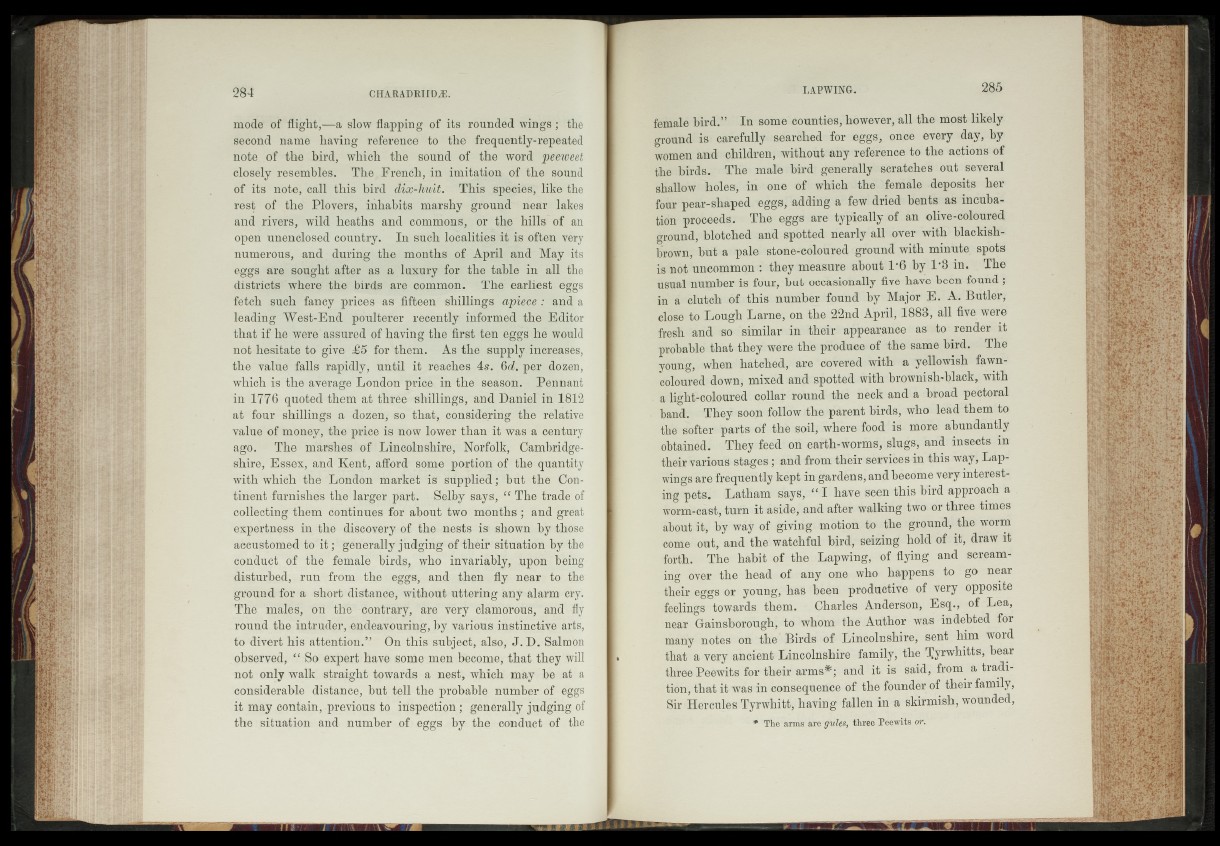
mode' of flight,—a slow flapping of its rounded wings ;*’the
second name having reference to the frequently-repeated
note of the hirdj which the sound of-the word jpéimeet
closely resembles. The 4 Erench, ip ' Imitation, of : the sound
of its note, call this bird dix-hwiît. This species', like the
rest of the Plovers, inhabits marshy ground" near lakes
and rivers, wild heaths and commons, or the hills of an
open unenclosed country. In sueh localities it' is oftemvéry
numerous, and j during the months of April and May its
eggs a re. sought after as a luxury for the table /all the
districts’where the birds are eommon. The earliest eggs
fetch such fancy prices as fifteen’ shillings' dffiékf; and!a
leading "West-End poulterer recently informed the Editor
that if he were" assured of having the first ten eggs- he would
not hesitate to" give dBS for^hem! As the stipply infipases,
the value falls rapidly, untlf it peaches 4s. 6fcper dozen,
which is the average London" p-ricji in the season". Pennant
in»P£76 quotedthem at three-shillings, and DanieTin 1812
at four shillings a- 'dozen/'So' that, considering^tnë'relative
value of money, the priee is now lower than it"was a benfcury
ago.-’ The marshes-'©^Lincolnshire, |Norfolk, Cambridgeshire,
Essex, and“^ÈeîÈt, afford" some portiomlï^lifôvquant%
with which thé “London market‘is Mppliédpbùt ^be f^n-
tihent'furnishes the larger part. -rfigliy says, ‘‘ The Ifa’de of
collecting them continues for about two months"; and great
expertnçss in the diseoyery-of the’nests is shown by-those
accustomed to 'it;1'generally judging of their situation by-»the
cppûfpét' oî the \fepàalé ' birds, who inTariaK|y;^
idasturbed, run from the eggs, - and then-* fly near to the
ground for a short distance, without-uttering any* alarm cry.
The' males, ón tïïê—contrary, are yërÿ* ol^hihrons, ‘and fly
round the intruder, endeavouring, by v%rious jhstineiiy©'-arts,
jjto divert hi s attention. ” On thfe-sUbjeltj alsoy- J . Saltn on
observed, ‘/.-So expert have some-men- Become, that they will
not only walk, straight towards a -nes#,-which' may bte at a
considerable distance, but' tell the probable nu-mbffcj of >©'ggs
it may contain, previous tP inspection ; generally judging of
the situation and number o f eggs by* the conduct off-the
female bird.” In some counties, however, all the most likely
ground is carefully-’-searched for nggs, once every day, by
women and' children, -without" any "reference to the actions of
the birds. The male i bird generally scratches out several
shallow *holes, in one of w h i c h -the female .deposits her
fear pear-shaped eggs,' adding a few! dried bents as incubation
proceeds; The eggs are typically of an olive-coloured
£retod; blotched and spotted nearly'all óver with blackish-
brown, but a pale stone-coloured ground with minute spots
isinothncommon■: they measure abouM'6 by 1’8 in. The
usual number is four, hut occasionally five have been found;
in a clutch óf this number found'by-Major EJAh Butler,
closest©"Lough Larne, on the. 22nd April; 1888', all five were
fresh and -so ‘similar in their appearance asito- render it
probable that-they;were the* produce of the same bird. The
young, when hatched, are covered with^a“ yellowish fawn-
coloured down; mixed and. spotted with brownislnblack,; with
a light'-coloured collar round the neck and a broad pectoral
band. They soon-follow Ahe parent birds, who; lead them to
tfcfe Softer parts of the soil, wberefbodfis more abundantly
obtained, iThey-feed on earth-worms,".slugs, andranseetsin
their various stages; and from their services in this way, Lapwings
:are frequently kept in-gardens, and beeome very interest-*'
ing pets. Latham says, “ I have seen this bard approach a ,
worm-oast, turn it aside, and after walking two or three times
about it,- by way of giving, motion tb* the ground, the worm
come out,, and the-watchful, bird, seizing hold of .it, draw it
-foSth. * The habit nf- the Lapwing, of flying and screaming
over the head- of any« one who happens to go near
fbeireggsferyoüngy has "been productive of very opposite
rfeejlngs- towards them. »„Charles Anderson, Esq#*of 'Lea,
near Gainsborough, to whom.* t-M®;Author was indebted for
many notes* on the Birds.’•©£* 'Lincolnshire/ sént him word
that a very anëfeafr Lincolnshire family, the Tyrwhiits, hear
thtoe.Beèwits fer their arms*; and it is said/.ftoifi^as tradition,
that -itwasin consequence of tlie "founder óf their family,
Sir'Hercules Tyrwhitf, having fallen in-a skirmish, wounded,
# arms- are’^wfes, three Peewits ’ór.